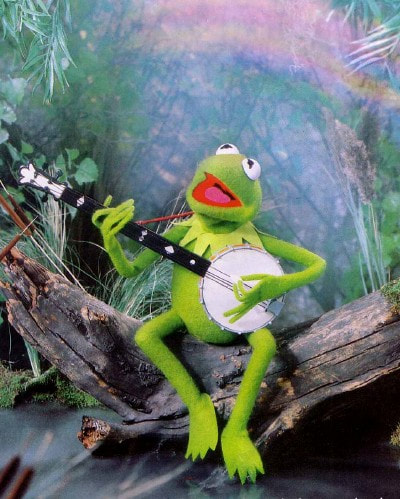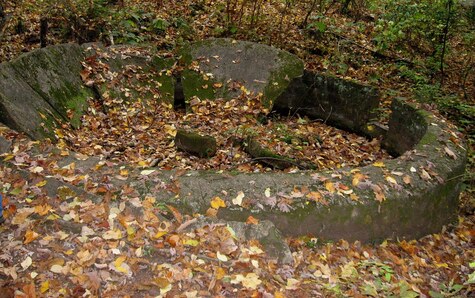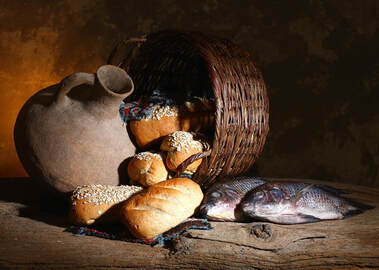all of the selves we Have ever been
 A strong southern breeze blew the blossoms off a row of young flowering trees. For a moment the petals swirled on the air like snowflakes and then lightly touched the ground. Scooting across the parking lot they came to rest along a curb forming a narrow stream of pink and white velvet. This little tributary of wonder was so breathtaking that I was compelled to stop and kneel on its asphalt shore. Gently, I scooped the petals into my hands. I felt their delicate softness as I brought my cupped hands to my nose. Breathing in their subtle fragrance, I satisfied a thirst I didn’t know I had. Ah! How the earth nourishes us in unexpected ways. On April 8th we here in central Ohio were in the path of the solar eclipse. For months the anticipation built. Schools closed for the day, people traveled hundreds of miles to get the best view. Even hospital workers left their duty stations and flowed out into parking lots to get a glimpse of this miraculous once-in-a-lifetime occurrence. As I sat poised at my window feeling the stillness and the darkness slowly permeate the peak of day, the voice of Kermit the Frog came to mind: What’s so amazing that keeps us stargazing? What do we think we might see? Maybe we are all wannabe believers, if not in miracles, then in magic. Mother Nature provides us with so much enchantment, and she does so while staying one step ahead of the scientists, perhaps to bedevil the calculations and the hypotheses, to continue to engage us, mesmerize us, and humble us. Moses once challenged God: “Show us your glory!” Old and weary, fearing an uprising from his followers, uncertain of the future or where they were going, Moses went into the mountains to have a word with God. Moses did not say, “Show us the money.” He said, “Show us your glory.” Surely, Moses was at a time in his life when he needed some encouragement, but I wonder if God was disappointed by the request. Every day glory surrounded the Israelites. The sea parted. Manna appeared on the ground for breakfast, quail wandered into the campground for dinner. Were the Israelites a bit like us? Too tired? Too preoccupied? Too self-focused? Too fearful? Fatigue and fear have a way of blinding us and dulling our senses. Perhaps for Earth Day 2024 our prayer should not be “show us your glory,” but help us to see it. Remove the blinding glare of narcissism and outrage, the pains of fear and discouragement, and help us to marvel at all the wonders that are free and available to us all. Help us to remember that we, too, are part of nature, another marvel of creation. Help us to experience the things we can believe in, even if fleeting. Remind us of wonder and possibility, of goodness, of things that are pure and without pretense. Help us to see the unseeable. Even though the solar eclipse has passed, help us to remember that the view is thick with majesty if we seek it just as earnestly. On Earth Day 2024, let us crack open the mundane everydayness of our lives, and stop watching bad news on our phones and TVs. Let’s get outside. No matter how discouraged we may be with the world, with life, nature can still surprise and delight us. The Earth is waiting. There is a living ecosystem beneath the sidewalk, butterflies are emerging from the bushes, buds are bursting with flower and fragrance, stars are streaking across the night sky, birds are singing…There is so much to believe in. Monday, April 22, is Earth Day. Meet me beneath the sky that we share, in the light and the warmth of the bright sun that spends itself for all of us. See you outside!
0 Comments
 In the midst of a pandemic that feels endless, already there is talk of the next crisis--water. Knowledgeable people are banking on it, trading water on the commodities exchange. News footage validates the forecast with images of dry river beds, massive wildfires, and places where critical ground water has been pumped beyond its limits to replenish. Waterways are polluted by industrial toxins, discarded plastics, and human waste. Around the world, people are on the move leaving behind land that is turning to dust. I sit here in my uneasy chair for some self-examination. I have taken the supply of water for granted my entire life. I turn on the tap and out flows cool, clean water. As a teenager living in the growing suburbs of Pittsburgh, I became familiar with families living outside the city limits whose homes had wells. Sometimes I visited them in the summer when the water was low and laundry had to be hauled to the laundromat, and the grass turned brown, and showers were limited to keep the wells from running dry. It all seemed so primitive to me from my perch in the privileged suburbs where the sprinkler ran for hours. In my mind’s eye, wells belonged in the old American west, to a world of gunslingers and dusty cattle drives, in barren places depicted on shows like Rawhide and Gunsmoke, a world of black and white, certainly not living color. Earlier experience had led me to this faulty conclusion. There were two giant concrete discs in my grandmother’s grassy backyard. It was only in fleeting moments of bravery that I dared to run across one of the discs. More often, I walked around them fearing that something dangerous lurked beneath and was just waiting to grab me by the ankles. Perhaps it was our happy lives above ground that skirted trouble from below. Above the ground life was vibrant. Children laughed while grabbing juicy pears from the tree overhanging the porch. Aproned women snipped dewy roses from thorny bushes that climbed white trellises along the back wall. Damp clothes hung shoulder-to-shoulder on the clotheslines, shooing away danger as they blew and snapped in the swift summer breeze. Screen doors slammed as we ran in and out of the house. Familiar voices filled the air like music. Somewhere along the way, I learned that the concrete discs in my grandmother’s yard were lids. They covered the cisterns that once upon a time collected rainwater to support life and clean laundry inside my grandmother’s house. I was dumbfounded. I never imagined that the ultra-modern home of my grandmother had a frontier history. How could that be when every modern innovation in the world was introduced to me there: wall-to-wall carpeting, automatic dishwashers, recliner chairs, color TV, and air conditioning? Clearly, gathering rain water was ancient history. Problem solved. We were modern taps and pipes people who relied upon the city water department to do the heavy lifting and keep the river of water flowing into our home. The magical innovations that appeared inside my grandmother’s house were not only evidence of a changing infrastructure, but evidence of a changing thirst, and we, like many Americans, became insatiable. We wanted more of the new, the time-saving, and the convenient. The economy was booming in the post-war era and so were the number of babies. Life had been hard. Now it was good. It was easy to believe that the frontier days of wells and cisterns were a thing of the past. We never imagined that water itself would disappear in our quest to make life not just easier, but effortless. We grew up as descendants of the American frontier and were fortunate to bring our children into a world of abundance and convenience, but our children face life on a new frontier, the frontier of climate change. Will their lives be better or more difficult than ours? As I downsize, focusing on what to keep and what to leave behind for my children, I look at my stuff and realize that I have never owned anything more precious than water. If I could do it all again, I would trade automatic dishwashers and color TVs for the life that existed in my grandmother’s backyard. I would buy insurance so that my children would be sure to know the cool, soft pleasure of moist green grass between their toes, the sweet flavor of pear juice trickling down their chins, the musky fragrance of velvety roses tickling their noses, and the sound of damp, clean clothes snapping in the breeze shooing away danger. I would have lifted those lids and saved for my children an inheritance that is the birthright of all children, the life-giving, thirst-quenching miracle that is water.  I attended a miracle. It happened yesterday. In a church basement. A friend invited me to the weekly Friday fish fry at her church. We went in her car and arrived to a jam-packed parking lot. We took a spot in one of the farthest lanes. Bracing ourselves against the bitter cold wind that puffed up our coat sleeves and bit at our ears, we tried to find the nearest open door. As we made our way, I noticed that the entire church complex was surrounded by a long string of cars waiting patiently in the take-out line. There were more cars than I have ever seen at any fast food place at meal time. My friend and I arrived inside and followed the hum of voices that led to the growing crowd. The line for food extended from the serving tables through the community room and further on into the multipurpose room. The line was long and slow moving. No one complained. Some children sat on the steps in front of the stage while others dribbled and passed a basketball occasionally shooting at the hoop. It was impossible to tell which children belonged to which adult. There was that loose, pervasive kind of supervision that occurs in familiar places full of multi-generational groups of happy people. A handful of adults sat around a square folding table where candy bars were on sale for a dollar a piece. A preschooler stood at the front of the table happily arranging and re-arranging the chocolate. We got in line behind an older male guest with a shuffling gait. He leaned on a cane. The male guest joined the conversation about the new Menards that opened this week. He told us about the Menards in Cincinnati that is three stories high. In line ahead of the older male guest were a mom, dad and daughter. The little girl was wearing bright pink high-top tennis shoes with floral ribbons for laces. The shoes glittered reflecting the light. Mom told us how the shoes came to be. The father admitted that his daughter got her love of sparkly things from him. We came first to the table where we purchased our tickets. Cash only. No apps. No self-checkout. We received handmade tickets that he been used over and over again; the edges were crooked and the middles worn thin from all of the thumbs that had rubbed them while waiting in line. People stopped to enter the 50-50 raffle, writing their phone numbers on the backs of small paper rectangles. As we progressed toward the buffet, a server appeared out of nowhere to assist the guest with the cane. The server got a tray and waited while the guest made his food selections, and then the server patiently fell into step with the short shuffling gait. Throughout the entire experience, a man kept re-appearing with large aluminum trays full of hot fried fish. I don’t know where he came from or where he went, but every few minutes a voice heralded his return, “Hot fish! Hot fish, coming through!” The service line was as jammed as the parking lot, except it was volunteers and not cars. Mostly older men filled our plates and refilled the serving dishes. School kids in uniforms staffed the dessert table and described the offerings. Men and women wandered the crowd squeezing into the tight spaces between tables and chairs to offer refills for the all-you-can-eat-fish diners. When the space between the seats was too tight, we all pitched in and passed the plates around. The room was loud and busy and joyful. There were babies in car seats, toddlers being offered spoons full of macaroni and cheese by dads who also were trying to sneak in a bit of fish. Parents, grandparents, teenagers, and neighbors--if you came by yourself, you were not alone. Not one individual sat staring into a laptop screen. Not a single cell phone was in use. The whole scene was so familiar. This was how I grew up—in church basements, at the VFW, the fire hall, the school auditorium. These were the places where my worlds and my people came together for fish fries, weddings, funerals, BINGO, bazaars, festivals, bake sales, school plays, and concerts. These gathering places were home away from home. It was a good feeling and a kind of dessert all its own. After we finished our meals, someone came to take our trays. My friend and I squeezed between chairs and into the main aisle. A man approached us to thank us for coming. He invited us back on one condition—that we bring two more with us. Maybe that is how miracles happen—people come two-by-two and sit side-by-side. We gather together in the spirit of community and the fish multiply. I will be back, and next time, I’ll see what happens to the water! |
AuthorLilli-ann Buffin Archives
July 2024
Categories
All
|
 RSS Feed
RSS Feed